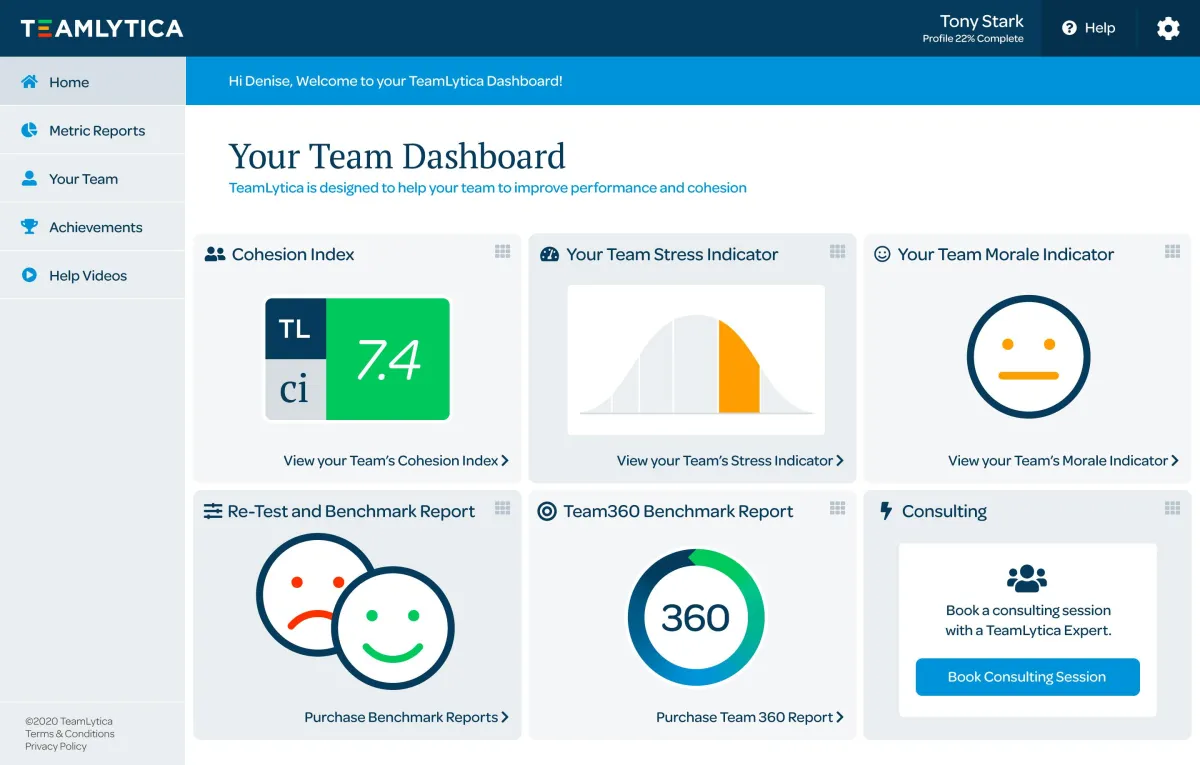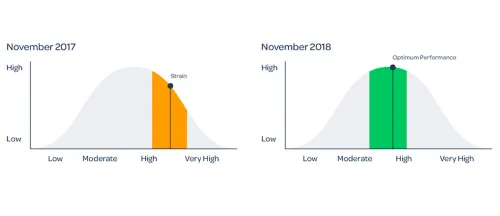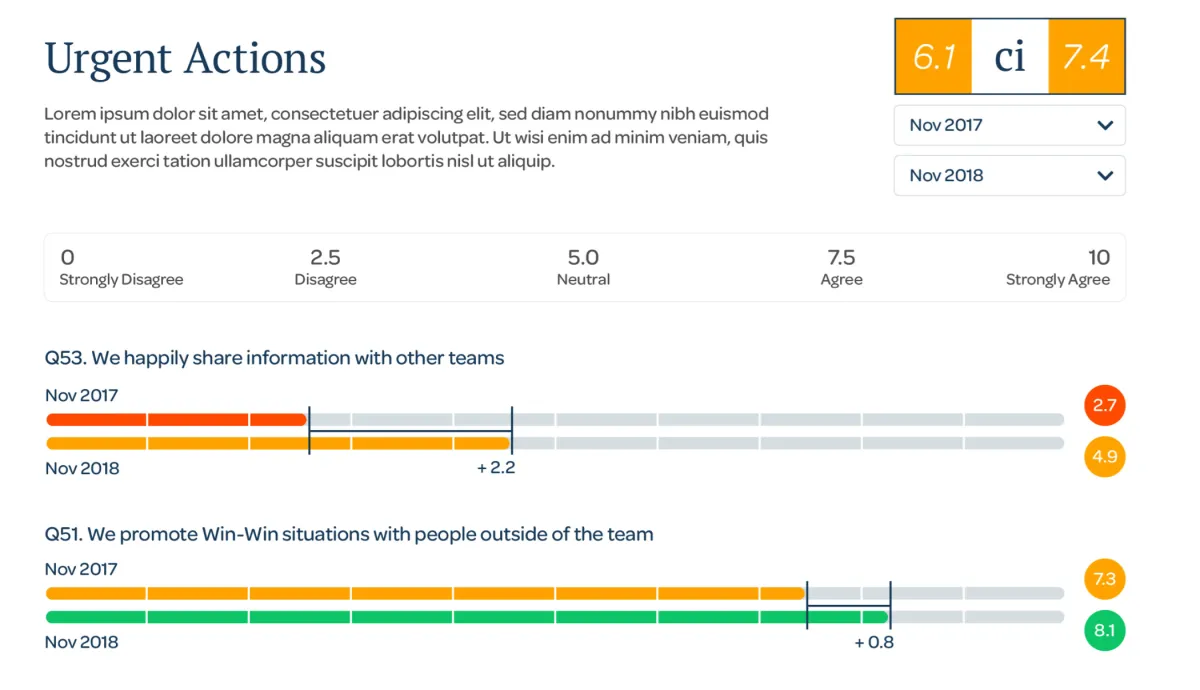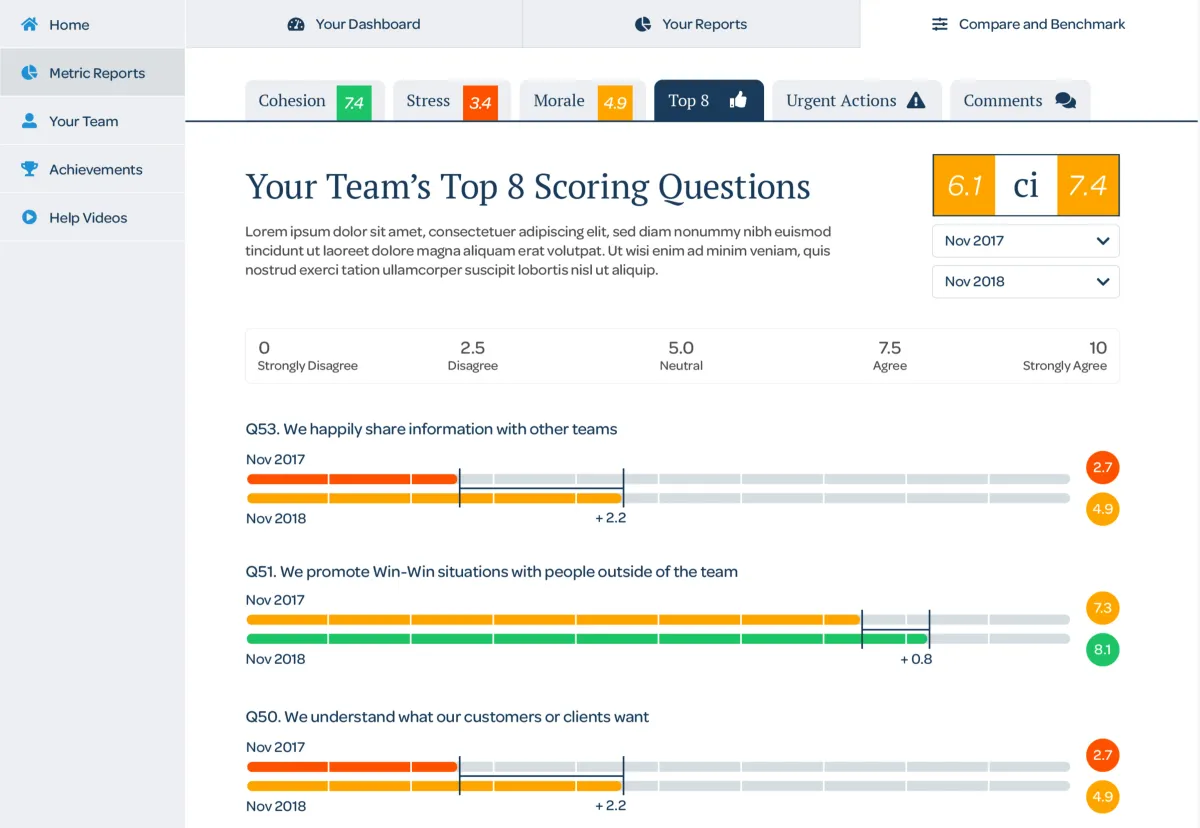Team360 Report
Get an external perspective on how the team is viewed by completing our unique Team360 assessment on them.
Team360 Report
Get an external perspective on how the team is viewed by completing our unique Team360 assessment on them.

What is a Team360 Report?
External feedback - both score-based and anecdotal - provided by stakeholders that interact with the team. Every metric within the report is compared to the team's original scores allowing for in-depth analysis.
Feedback can be sought through any combination of stakeholders and either used as individual job-related comparisons or combined together into a single report. They include:
Suppliers
Clients
Colleagues

What is a Team360 Report?
External feedback - both score-based and anecdotal - provided by stakeholders that interact with the team. Every metric within the report is compared to the team's original scores allowing for in-depth analysis.
Feedback can be sought through any combination of stakeholders and either used as individual job-related comparisons or combined together into a single report. They include:
Suppliers
Clients
Colleagues
Why complete a Team360 Report?
Teams don't work in isolation and their team scores will be self-perception. By asking key stakeholders to assess the team, they will receive detailed and measurable feedback that can be compared agains their own scores.
Development focus can be given to lower-scored areas that will have an immediate positive impact to output or stakeholder relationships.


More Coaching Opportunities for YOU
Where there are disparities between a team and benchmark score, these provides coaching and training opportunities. Specific training and support can be offered that either either closes the gap or allows the team to understand why they might think they are better than they actually are.
Measure, Manage, Improve
Your role is to help drive the team forward. What you measure you can as a manager is to continually monitor and improve what the team does. In almost any environment, the needs and influences and pressures on the team change frequently.
Understanding and positively reacting to these changes in both the short and longer-term will help your team deliver its KPIs.


Perception Vs Reality
Things often change within a team. If scores are increasing, ask yourself if this is because of your interactions, those of the team or external factors.
Likewise, scores can decrease which may be an indicator that more focused is required in those areas or, that external factors have had a negative impact on the team.
Use the data and Actions to keep moving things forward.
Close those Gaps
Alignement is key between the team and their stakeholders
Over-confidence - The team score themselves highly and probably think they are better than they actually are. Grounding required.
Under-confidence - The team scores do not reflect how they work togethers. They need building up and stakeholder feedback helps.
Alignment - The team and stakeholders agree on how the team performs, what works well and what areas need attention.


Why complete a Team360 Report?
Teams don't work in isolation and their team scores will be self-perception. By asking key stakeholders to assess the team, they will receive detailed and measurable feedback that can be compared agains their own scores.
Development focus can be given to lower-scored areas that will have an immediate positive impact to output or stakeholder relationships.

More Coaching Opportunities for YOU
Where there are disparities between a team and benchmark score, these provides coaching and training opportunities. Specific training and support can be offered that either either closes the gap or allows the team to understand why they might think they are better than they actually are.

Measure, Manage, Improve
Your role is to help drive the team forward. What you measure you can as a manager is to continually monitor and improve what the team does. In almost any environment, the needs and influences and pressures on the team change frequently.
Understanding and positively reacting to these changes in both the short and longer-term will help your team deliver its KPIs.

Perception Vs Reality
Things often change within a team. If scores are increasing, ask yourself if this is because of your interactions, those of the team or external factors.
Likewise, scores can decrease which may be an indicator that more focused is required in those areas or, that external factors have had a negative impact on the team.
Use the data and Actions to keep moving things forward.

Close those Gaps
Alignement is key between the team and their stakeholders
Over-confidence - The team score themselves highly and probably think they are better than they actually are. Grounding required.
Under-confidence - The team scores do not reflect how they work togethers. They need building up and stakeholder feedback helps.
Alignment - The team and stakeholders agree on how the team performs, what works well and what areas need attention.
Accredited Coaches
Only accredited coaches can use TeamLytica.
The training and support you get will ensure you have the right level of knowledge to be able to coach teams as well as individuals. Then our reporting platform gives you a strong structure, providing you with a foundation that you can build on with your own knowledge and experience.
Find out more about our solution:
Keep up to date with our
News & Blogs

Non-Profit & Charity
Non-Profit & Charity
Managing volunteers can often be challenging as their motivation might not be aligned to the team or organisation.
The challenges facing charities and non-profits are extreme. Figures indicate that there are more than 185,000 charities in the UK, with an additional 5,000 added every year. Managers and their teams, therefore, must find money to sustain their operations, even in the presence of increased competition.
Non-profits and charities need to diversify their revenue streams, adjust to new regulations, and find ways to plug skills gaps. Organisations will only achieve those goals, however, if they have competent, functional teams.
Here’s where TeamLytica can help. It’s a bespoke platform designed to root out team and management issues that might plague your charity or non-profit and provide actionable solutions enabling you to rectify the problem.
Using KITE – K – Knowledge, I – Insights, T – Training, E – Empowerment.
The way that the platform works is simple. Employees in your organisation complete the TeamLytica’s KITE survey – a series of 54 questions covering nine critical team and management domains. The platform then compiles the data to generate a 28-page report on the performance of your team and steps managers can take to improve the situation.
The questionnaire is entirely confidential, so you get honest feedback. What’s more, it covers all the critical issues that are important for a capable, functional team, including leadership, trust, resilience, harmony and the ability to serve stakeholders.
Non-profit and charity organisations can sometimes struggle to incentivise quality work. It’s incumbent on leaders, therefore, to align employees with the goals of the organisation and ensure that they get the best possible performance from them. The Team Summary section of the report provides critical insights into each of the factors that determine the health of your team, providing an average score overview, as well as comments for what might be going wrong.
The report also contains a series of action plans based on the results. Thus, you get insights for how to best approach the various factors that might be holding you back.
We aim to do things a little differently at TeamLytica – we’re here to help.
Research from NCVO reveals that the public wants more data on how charities are run. Reports from TeamLytica help you find out whether the teams in your organisation are finding effective ways to deal with the external pressures that they face from the public, donors and other stakeholders.
Many charities comprise multiple teams, focused on a variety of different projects. As any experienced non-profit or charity manager knows, some units can be vastly more effective than others. TeamLytica’s platform provides a host of tools that you can use to root out problems in specific teams and correct them. The comparison panel lets you compare units that might be failing with those that are not, based on their feedback in the KITE survey. You can quickly identify pressing management issues and make changes based on real data.
When non-profits and charities have effective teams, they’re able to deliver powerful, world-changing results and attract more funding. The more management insights you can glean about people in your organisation, the more efficiently they’ll be able to deliver projects in the field. With TeamLytica’s actionable insights, you can take steps today to build a more robust team of people.

Tyrelle Mcleod-Bentley
Director
Soccer Assist
The irony is not lost on us that we recruit and place the next generation of sports stars who all have to excel in teams. The Teamlytica platform has helped us get to a place where we're proud of our own team performances.

Anita Dev
Director
TeamWork ADL
The team reports have really helped our team and given our senior leaders the knowledge we've needed to make effective changes to the way we work and manage.

Steve Chown
Entrepreneurial Innovation Manager
TeamLytica's software has been identified as a valuable tool to check the effectiveness of newly combined teams in the Bank. We are using it to review their progress as the staff become more integrated.

Tyrelle Mcleod-Bentley
Director
Soccer Assist
The irony is not lost on us that we recruit and place the next generation of sports stars who all have to excel in teams. The Teamlytica platform has helped us get to a place where we're proud of our own team performances.

Anita Dev
Director
TeamWork ADL
The team reports have really helped our team and given our senior leaders the knowledge we've needed to make effective changes to the way we work and manage.

Steve Chown
Entrepreneurial Innovation Manager
TeamLytica's software has been identified as a valuable tool to check the effectiveness of newly combined teams in the Bank. We are using it to review their progress as the staff become more integrated.












